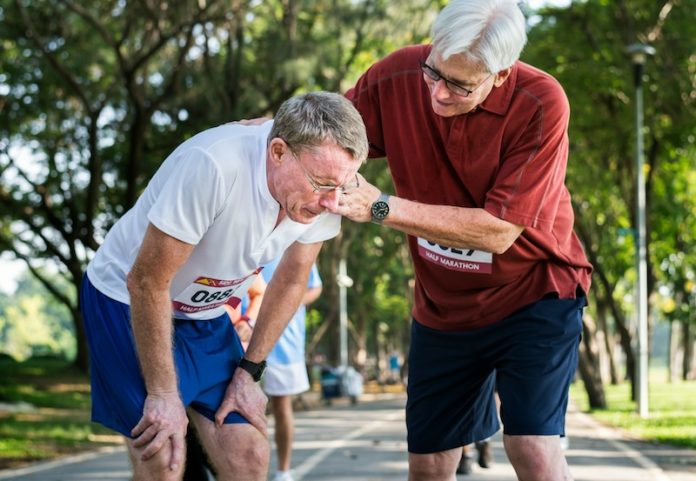
As people age, physical weakness becomes a common issue, often leading to reduced mobility and a lower quality of life. Traditionally, this weakness was thought to be primarily due to changes in the muscles themselves.
However, a recent study from Ohio University has shed new light on this problem, suggesting that the underlying cause of age-related weakness might be more related to impairments in brain and nerve function rather than just muscle deterioration.
The study involved 66 older adults, all in their 70s, who were divided into three groups based on their physical strength: severely weak, modestly weak, and strong. The researchers used a standardized physical test to categorize the participants.
During the test, the participants were asked to push against resistance using their leg muscles with as much strength as they could muster. After they reached their maximum effort, the researchers applied electrical stimulation to the muscle.
If the muscle produced more force after the stimulation, it indicated that the muscle itself was not the primary limitation in strength.
The findings were significant. The weaker the participants were, the more their muscles responded to electrical stimulation.
On average, the severely weak group showed a 14.2% increase in muscle force after stimulation, which was double the 7.1% increase observed in the strong group.
This suggests that the nervous system plays a crucial role in the muscle weakness experienced by older adults. In other words, the problem may lie more in the brain and nerves’ ability to control the muscles rather than in the muscles themselves.
These results have important implications for how we approach the prevention and treatment of age-related muscle weakness.
By identifying the nervous system as a key factor, researchers can now focus on developing strategies to enhance nerve function and potentially prevent or reduce weakness in older adults.
Brian Clark, one of the researchers involved in the study, also noted that these findings might be relevant for other conditions related to muscle weakness, such as those caused by injuries or illnesses that affect the nervous system.
The study, published in JAMA Network Open, provides valuable new insights into the causes of age-related weakness.
It highlights the importance of the nervous system in maintaining muscle strength and suggests that future treatments might need to target nerve function as much as, if not more than, muscle health itself.
Preventing Age-Related Weakness
While the Ohio University study offers hope for new treatment strategies, there are already several steps that older adults can take to prevent or slow down age-related weakness. Here are some practical tips:
Exercise Regularly: Engaging in regular physical activity is one of the most effective ways to maintain muscle strength and mobility. Both cardiovascular exercises, like walking or swimming, and resistance training, such as weight lifting or bodyweight exercises, are beneficial.
Seniors should aim for at least 30 minutes of exercise five days a week or follow their doctor’s advice on an appropriate exercise regimen.
Eat a Healthy Diet: A balanced diet rich in fruits, vegetables, whole grains, lean proteins, and low-fat dairy products can help keep muscles strong. Staying hydrated is also crucial, as dehydration can affect muscle function.
Get Enough Sleep: Sleep is essential for the body to repair and regenerate tissues, including muscles. Seniors should aim for seven to nine hours of sleep each night to support overall health and prevent weakness.
Manage Stress: Chronic stress can negatively impact the body, contributing to muscle weakness. Techniques like meditation, deep breathing exercises, or talking to a therapist can help manage stress levels.
Stay Active Throughout the Day: Prolonged sitting can lead to muscle weakening. Seniors should try to stay active throughout the day, even if it’s just taking short walks, stretching, or doing light activities around the house.
Avoid Smoking and Excessive Alcohol Consumption: Both smoking and heavy alcohol use can harm muscle function. Seniors should avoid smoking and limit alcohol intake to one drink per day for women and two drinks per day for men.
Regular Medical Check-Ups: Regular visits to a healthcare provider can help detect and treat conditions that might contribute to muscle weakness, such as osteoporosis or vitamin deficiencies.
Seniors should work with their doctors to develop a personalized plan to maintain their muscle health.
In summary, while age-related weakness is a common issue, there are steps that older adults can take to prevent or mitigate its effects.
Regular exercise, a healthy diet, adequate sleep, stress management, staying active, avoiding harmful habits, and regular medical check-ups are all key components of maintaining muscle strength and mobility as we age.
By taking these steps, seniors can enjoy a higher quality of life and maintain their independence for longer.
If you care about nutrition, please read studies about what you need to know about supplements and cancer, and this supplement could reduce coughing, congestion, and sore throat.
For more information about nutrition, please see recent studies that vitamin D can help reduce inflammation, and results showing vitamin K may lower your heart disease risk by a third.
Copyright © 2024 Knowridge Science Report. All rights reserved.



